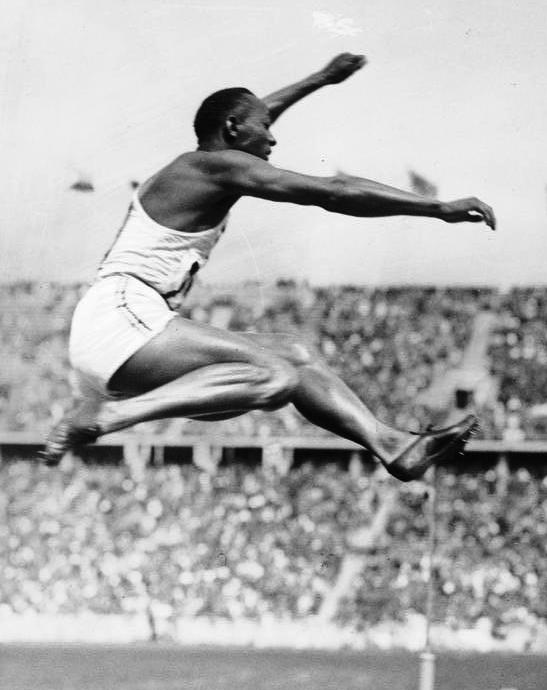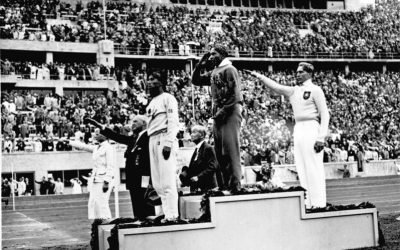In the records of sports history, few names shine as brightly as that of Jesse Owens. His story is not just one of athletic prowess but of profound human spirit triumphing against the odds. At the 1936 Berlin Olympics, Owens not only clinched four gold medals but also struck a blow against Nazi claims of Aryan superiority, making a statement far beyond the confines of the track. His achievements in the face of racial discrimination in the United States and abroad mark him as a true icon of resilience and dignity.
Early life and challenges
Jesse Owens was born on 12 September 1913 in Oakville, Alabama, into a family of sharecroppers, a world away from the Olympic glory that awaited him. The Owens family was part of the Great Migration, moving to Cleveland, Ohio, in search of better opportunities. Despite the change in location, the spectre of poverty and racial discrimination loomed large. Yet, in the bustling streets of Cleveland, it was here that Owens first discovered his gift for running, a talent that offered a glimmer of hope and escape.
Under the guidance of Charles Riley, his high school coach who saw the potential in Owens, he began to hone his skills, setting the stage for his future successes. Owens’ early life was a testament to the power of resilience. Using his athletic talent, he carved out a space where he could stand apart and be recognised for his abilities, even in a world that sought to limit him because of his race.
Owens’ journey took a pivotal turn at Ohio State University, where he continued to excel in track and field despite facing segregation and discrimination. In 1935, Owens astounded the world by setting three world records and tying another in just 45 minutes at the Big Ten Championships. This feat, unparalleled in the history of track and field, signalled Owens’ readiness for the global stage—the Olympics.
The 1936 Berlin Olympics: A defiant stand against nazism
The 1936 Berlin Olympics was a stark backdrop to Owens’ greatest triumphs. Amidst the rise of Nazi Germany, with its vile ideology of racial superiority, Owens’ participation was a beacon of hope and defiance. He emerged victorious in the 100m, 200m, long jump, and 4x100m relay, not only debunking Nazi myths but also highlighting the absurdity of racial discrimination through sheer excellence.

It’s widely believed that Adolf Hitler snubbed Owens by refusing to shake his hand, but the truth is more nuanced. Owens himself stated that Hitler waved at him, and he waved back, and the supposed snub may have been exaggerated over time. In fact, Owens was not snubbed by Hitler on the day of his victories because Hitler had already left the stadium, and the International Olympic Committee had instructed him to either congratulate all winners or none at all, leading him to choose the latter.
Owens’ performance in Berlin was a significant moment for the civil rights movement. It demonstrated the fallacy of racial superiority theories.
Perhaps the most enduring image from these Olympics was Owens’ friendship with Luz Long, the German long jumper. Their camaraderie, in the face of Hitler’s racist ideologies, showcased the unifying power of sports. Despite Owens’ monumental achievements, his return to the United States was met with a mixed reception, underscoring the racial prejudices still rampant in his home country.
Post-Olympic life and legacy
After the Olympics, Owens faced significant challenges, struggling to find financial stability and recognition in a segregated America. He engaged in various efforts to promote the sport and worked tirelessly for youth, embodying the spirit of perseverance and dedication. Over time, Owens began to receive some of the honours he had long deserved, including the Presidential Medal of Freedom, which was awarded posthumously.
Jesse Owens died of cancer at age 66 in Tucson, Arizona, on 31 March 1980. His legacy extends far beyond his athletic achievements. He paved the way for future generations of athletes of colour, challenging societal barriers and advocating for equality. Today, his life is celebrated through monuments, awards, and recognition of his contributions to sports and society.
Jesse Owens remains a towering figure in sports and a symbol of the enduring human spirit. His inspiring story is marked by unparalleled achievements on the track and a lifelong fight for dignity and equality. Owens demonstrated that true greatness transcends the boundaries of race and nationality, serving as a beacon of hope and resilience.





